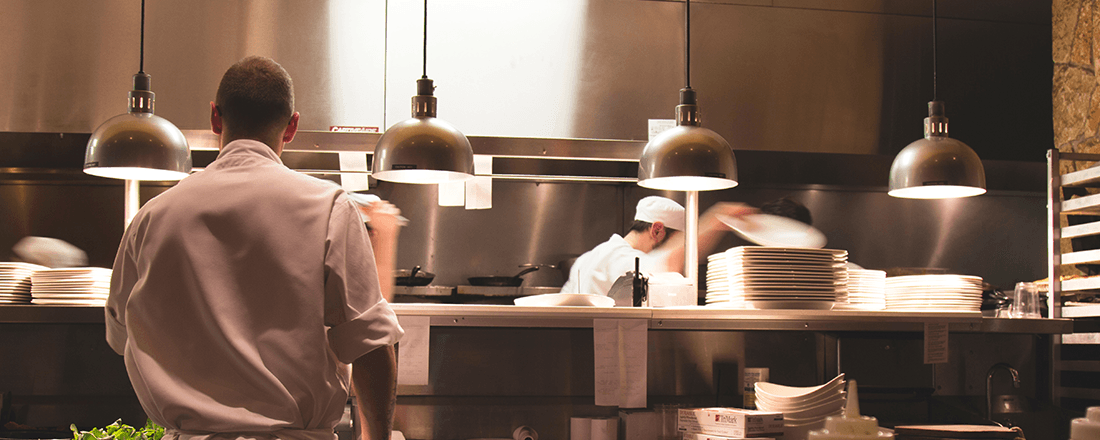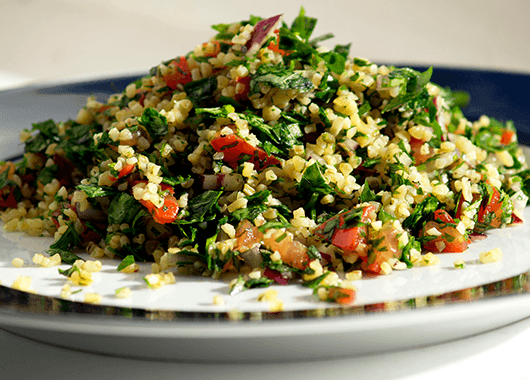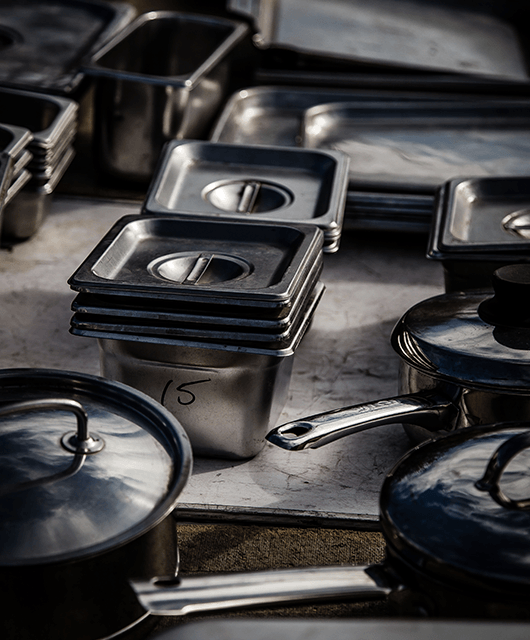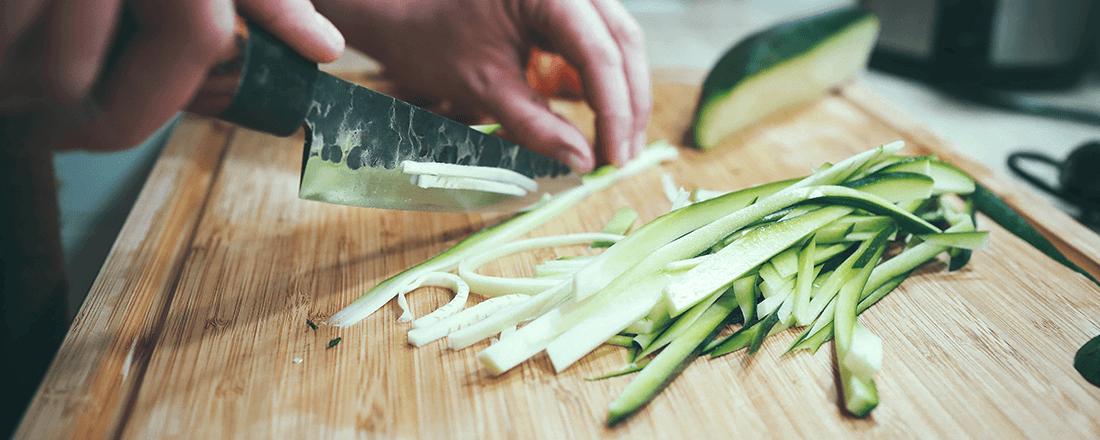SASHA ELKIN
If you told me 6 months ago that I would leave my job in the entertainment industry in Los Angeles to slice lemons and make ketchup in the commercial kitchen of a high-end restaurant across the country, I would’ve called you crazy. And yet, here I am, doing just that and, frankly, loving it.

In April, I left behind my office job and the “normal” life that accompanied it to train as a restaurant manager with an established restaurant company. I had been considering a switch in industries for a while but had never had the guts to actually submit the application that I had already filled out and saved to a hidden folder on my office desktop. Fear of failure had held me back. What if I wasn’t tough enough to work in a restaurant kitchen, a notoriously rough and tumble, not to mention aggressively masculine, work environment? What if I made the switch and still felt the same aimless malaise that had been trailing me in my jobs in the entertainment world? And what would my peers and mentors think? There goes Sasha, they’d say, yet another useless liberal arts degree-holder that couldn’t cut it in the business world.
After a few months of indecision, a big change in my life forced my hand and made a career switch all the more attractive: the entertainment marketing start-up I had been working for the past year was getting acquired by a larger company, and they were laying off a third of their staff. After cycling through the embarrassment and hurt I felt upon hearing the news from my bosses, my thoughts went quickly to my restaurant application. A week later, I walked nervously into my first interview. Two weeks later, I was hired as the company’s newest manager-in-training in one of their most beloved locations: East Hampton, NY.
The company’s management training process was well-respected in the restaurant industry for being comprehensive and effective, and not to mention intense. Trainees were thrown right into the inner workings of the restaurant for a four-month period, performing every role from greeter to server, to dishwasher, to prep cook, to line cook, and more. After this rotation ended, trainees would “graduate” into full-fledged managers and be transferred to a new restaurant in the company’s collection in order to further hone their management skills.
The first few weeks of my training were a blur of adrenaline, exhaustion, awe, terror, and joy. I gawked at servers who worked back-to-back-to-back-to-back double shifts, barely breaking a sweat. I marveled at managers who came in on their days off to make sure schedules were made and supplies were ordered and new staff members were properly trained. I openly stared at the burly guys working on the line, expertly darting from station to station to cook steaks and assemble hamburgers to fulfill the food order tickets that flooded endlessly into the pass during a Friday night rush. In the early weeks of training, I found it difficult to imagine myself as a part of this intricate and beastly machine. I was still an outsider, learning how to ease myself into my new role.

It wasn’t until I traded in my server uniform for my chef coat that I began to feel a part of the restaurant team and to understand just how much each member of the team relies on one another to ensure the smooth functioning of the restaurant as a whole. I was entering the kitchen — or “back of house” portion of my training — and I was about to experience the biggest mental and physical challenges of my new job to date.
What if I wasn’t tough enough to work in a restaurant kitchen, a notoriously rough and tumble, not to mention aggressively masculine, work environment?
No matter what kitchen role I was performing for the day — dishwasher, line cook, expeditor — my day always began as a prep cook. Prep cooks’ responsibilities are vast and include preparing ingredients and executing recipes that are used on the line during service. For example, preparing French fries to be deep fried to order, mixing salad dressings or guacamole, seasoning ribs for slow-roasting, making hot fudge from scratch: all of these lie in the realm of responsibility of a prep cook and are absolutely necessary to completing a guest’s meal once their order is taken.

I, being completely new to a commercial-grade kitchen and comparably incompetent in all prerequisite kitchen skills, was entrusted with the least skill-intensive prep items, which included mixing coleslaw dressing, portioning ingredients for our deviled eggs, slicing lemons for fish, and making tabbouleh, a popular side dish for many of our entrees.
Every day, I would arrive in the kitchen, button up my chef coat, tie on my apron, and dive into my hours of work. And every day, I would strive to be more precise, more efficient, and, most importantly, faster than I was the day before… to mixed results, if I’m being perfectly honest. I didn’t realize just how much of a toll the work would take on my body: hours of standing in one place at my prep station wore on my back; callouses developed on my palms from the repetitive use of a massive chef’s knife; my forearm muscles ached and grew from aggressive chopping motions and lifting gallons of sauces and produce to and from our walk-in fridge.
Once my body became more physically used to this new dose of physical labor (I laugh when I recall the days of being “too tired” to stand at my standing desk for more than a couple hours), my mind began to process the psychological demands my job presented. The philosophy lover that I am, I soon realized that working in a kitchen is perhaps one of the most existential jobs out there. At least, it had been the most existential job I had ever performed. This is because the ultimate goal of the kitchen worker is repetition. Perfect, efficient repetition of the same recipes and preparations over and over and over again, every single day. It’s an endless rehearsal process for a play that you’ll never get to be in, or see, or hear the applause for. This repetitiveness allows a prep cook to easily slip into a kind of automation; a mindless, robotic going through of the motions that requires neither self-awareness, presence, or creativity.

On top of this existential trap lies another more immediate hurdle to success in the kitchen: pressure. When you’re an hour behind schedule trying to dice up 2 quarts of cucumbers while also making sure your roasted garlic doesn’t burn and wondering how you will ever finish juicing 10 cups of lemon juice in time for the salad station to use some to make their Caesar salad dressing for dinner, nothing has the potential to be existentially fulfilling or prize-worthy. Frankly, you feel like a nerve-wracked freak obsessing over produce. The stress of the kitchen is a constant that one simply must learn to live with.
Somehow, as both my body and mind slowly became stronger and more adapted to the kitchen, I began to make out the existential challenge of prep work that I came to find so captivating: how do I find personal satisfaction and fulfillment in these impersonal, repetitive, and stressful tasks? The gratification comes over time through noticing the tiny details that make each day at work slightly different and reveal a subtle but expanding progress in my own development as a food industry worker.
For example, one day the kitchen received a different brand of sour cream with our dairy shipment, which made my coleslaw — something I made every single day without alteration — slightly thicker and paler in color than my usual batches. I noted this in my mental filing cabinet of recipes that I had memorized. This detail probably seems absolutely and pathetically pointless to you, but to me, noticing that slight change in my dressing proved that I was developing the same mental astuteness that our head chef and seasoned kitchen staff seemed to have been born with.
It’s an endless rehearsal process for a play that you’ll never get to be in, or see, or hear the applause for.
As time wore on, details like these became easier to recognize, imbuing each day in the kitchen with dozens of new points to pique my curiosity: one day, I noticed how much faster I was at julienning cucumbers thanks to the new hand positioning my colleague Brandon — our main prep guy — had shown me. Jose, our fried chicken specialist, showed me a clever way to cut corn off the cob using a kitchen rag and sheet pan, which improved the consistency of the corn kernels in my tabbouleh recipe. Again, these details are inconsequential blips in the grand scheme of the entire functioning of the restaurant — let alone of the universe — and yet, they managed to give me the satisfaction and meaning I had been fruitlessly searching for in all my past jobs.

Perhaps the most important details I came to recognize — and the ones that made my workdays the most special — were the person-to-person interactions I had with my kitchen-mates. Unlike the way our prep work was perceived, these interactions were anything but repetitive, robotic, non-creative, or impersonal. To illustrate, I learned new Spanish slang words from Gio, a studly twenty-something who arrived in the late afternoon to roast our rotisserie chickens and prime ribs, chop the cabbage to mix with my coleslaw dressing, and make our buttery, creamy mashed potatoes. I shared many a knowing look and stifled laugh with Fanny, our Ecuadorian prep cook and one of the few women in the kitchen, whenever the weather was crappy or whenever a particularly obnoxious repairman took up too much space in our prep areas. Fanny had weekends off — when she would make huge meals for her family — so I’d always sneak her a bag of the leafy ends of my chopped celery, which she would use in big salads. When Evan, our hugely muscled but soft-spoken line chef, chastised me for my misshapenly diced red onions used on our side salads, I quickly made it up to him by baking some oatmeal raisin cookies, for which he offered to pay me in order to bring him weekly installments of home-baked goods.
All these moments, even the ones seemingly unrelated to cooking and kitchen work, gave me hard proof that I was growing in my role, both in skill and in personal integrity. The more I recognized the changes and nuances happening on the cutting board before me and in the minds and hearts of my coworkers, the more my satisfaction grew, until each day went from being a stressful list of monotonous chopping and mixing to a colorful journey bursting with opportunities for knowledge, growth, and self-awareness.
[…] I soon realized that working in a kitchen is perhaps one of the most existential jobs out there. At least, it had been the most existential job I had ever performed. This is because the ultimate goal of the kitchen worker is repetition.
I was — and still am — proud of the physical, interpersonal, psychological, and existential hurdles I overcame and lessons I learned in my four months in the kitchen. Looking back on my whole experience, I realize that the thing I am possibly the proudest of is the fact that I derived this entire essay from the act of making coleslaw dressing for roughly 100 days straight. How’s that for existential absurdity?





